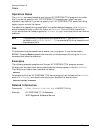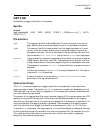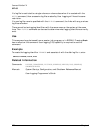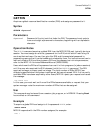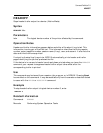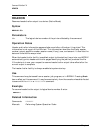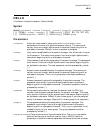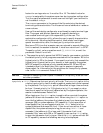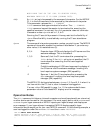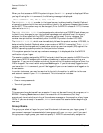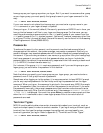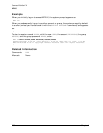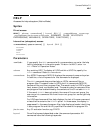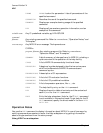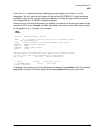
282 Chapter 4
Command Definition F-K
HELLO
factors for carriage returns. It must be 10 or 18. The default value for
termtype is assigned by the system supervisor during system configuration.
This is a required parameter to ensure correct listings if your terminal is
not the default termtype.
The termname parameter is the name of the file containing the desired
terminal-type characteristics. The file cannot have a lockword or reside on
a user volume.
Users of the workstation configurator are allowed to create terminal-type
files. The proper and efficient operation of a specific device by a
user-created terminal type is the responsibility of the user. The
workstation configurator utility allows the user to specify characteristics
of the terminal, including data flow control, block mode, read trigger,
special characteristics, echo, line feed, parity, and printer control.
cpusecs Maximum CPU-time that a session can use, entered in seconds. When the
limit is reached, the session is aborted. It must be a value from 1 to 32767.
To specify no limit, enter a question mark (?), UNLIMITED, or omit the
parameter. Default is no limit.
BS, CS, DS, or ES The execution priority queue that MPE/iX uses for your session, and also
the default priority for all programs executed within the session. BS is the
highest priority, ES is the lowest. If you specify a priority that exceeds the
highest priority permitted for your account or user name by the system,
MPE/iX assigns the highest priority possible below BS. DS and ES are
intended primarily for batch jobs; their use for sessions is generally
discouraged. For information on the guidelines for these priority queues,
refer to the TUNE command. Default is CS.
CAUTION Use care in assigning the BS queue. Processes in this priority class can lock
out other processes.
inputpriority or HIPRI Determines the input priority of the job. The inputpriority option is the
relative input priority used in checking against access restrictions imposed
by the jobfence. The inputpriority option takes effect at logon time and must
be from 1 (lowest priority) to 13 (highest priority). If you supply a value
less than or equal to the current jobfence set by the system operator, the
session is denied access. Default is 8.
When logging on, the HIPRI option is used to either override the system
jobfence or to override the session limit. When using the HIPRI option to
override the jobfence, the system first checks to see if you have system
manager (SM) or system operator (OP) capability. If you have either of
these capabilities, you are logged on and your INPRI defaults to the
system's jobfence and execution limit. If you do not have either of these
capabilities, the system attempts to log you on using INPRI=13 and
succeeds if the jobfence is 12 or less, and if the session limit is not
exceeded. Only users with SM or OP capability can use the HIPRI option
to override the session limit to log on. Use of the HIPRI option without SM
or OP capability causes the following warning to be displayed:



